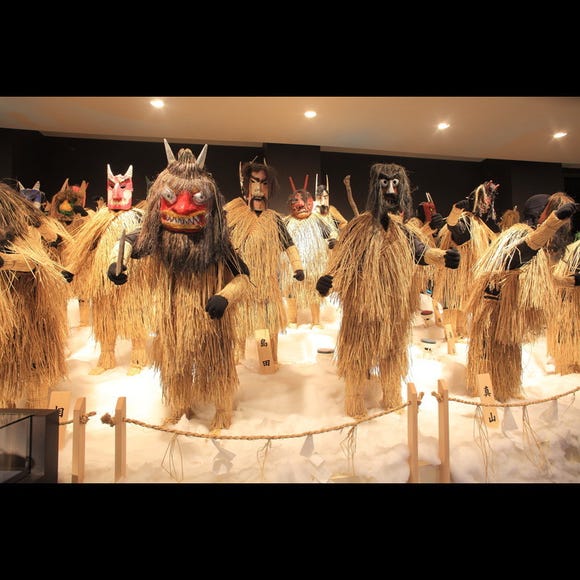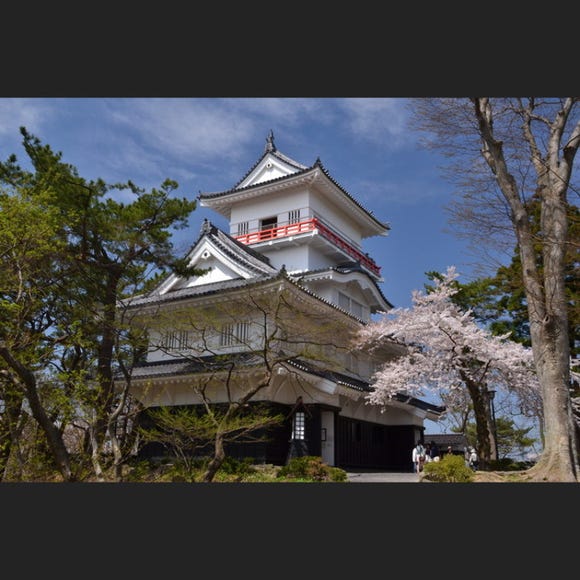
Dakigaeri Gorge in Senboku City, eastern Akita Prefecture, is a National Place of Scenic Beauty and one of the region’s most beloved autumn destinations. From early October to early November, the virgin forest bursts into vivid color, set against the striking cobalt-blue river below. A leisurely 30-minute hiking course lets visitors take in the gorge’s most stunning views.
(This article contains affiliate links)
- Table of Contents
-
- Best Seasons to Visit Dakigaeri Gorge: Summer and Autumn
- About Dakigaeri Gorge
- Getting Started: Dakigaeri Shrine
- Dakigaeri Gorge's Breathtakingly Beautiful Blue Stream
- Mystical View of Dakigaeri Gorge From Seiganji
- Near Dakigaeri Gorge: Kimpo Jinja with Large Nio Statues and the Magnificent Cedar Avenue
Best Seasons to Visit Dakigaeri Gorge: Summer and Autumn
Dakigaeri Gorge stretches for about 10 kilometers along the midstream of the Tama River, which flows into Lake Tazawa and Kakunodate Town. It forms part of the Tazawako-Dakigaeri Prefectural Nature Park and is only a 15-minute drive from JR Kakunodate Station, making it an easy side trip.
Consider Renting a Car at JR Kakunodate Station
For maximum convenience in exploring the area, we recommend renting a car with Nippon Rent-a-Car at JR Kakunodate Station, which offers a 10% discount. Most major firms provide similar vehicle lineups, options, and insurance, with only minor differences in price, but Nippon stands out for being the first to offer nationwide English customer service. Its multilingual support makes it especially convenient for international visitors.
You can book online by selecting your rental dates, vehicle type, and any options, with the estimated cost shown at checkout. Keep in mind that some options may not be changeable or refundable after booking.
Reservations can also be made by phone between 8 AM and 8 PM. If visiting a branch in person, allow extra time to complete the contract and receive explanations about the rental.
About Dakigaeri Gorge

The name Dakigaeri (“hugging back”) comes from the days when the narrow mountain paths were so precarious that travelers had to hold on to one another to pass safely.
The beautiful scenery of odd-shaped boulders, waterfalls, the clear blue stream, and the lush virgin forest of cherry trees and maple trees is called the Yabakei of Tohoku.
Many tourists visit the area from mid-June to late August to see the fresh vegetation and early October to early November to see the autumn leaves. In 2025, the foliage is expected to peak around November 4.

There are walking paths in the Dakigaeri Gorge area, which provide a great experience walking along the river. Some might be put off by exploring a gorge; however, the course is 1.5km long one way and takes about 30 minutes on foot.
Also, there are very few slopes, making the Dakigaeri Gorge hiking course perfect for beginners. We slipped into some comfortable clothes and decided to check out the area.

Getting Started: Dakigaeri Shrine
Before entering the gorge, it’s worth stopping at Dakigaeri Shrine near the trailhead. The shrine dates back to 1673, when the former Dakigaeri Village (now the Wakamatsu region) faced a devastating drought. Villagers prayed for rain at the gorge’s water source, and their crops were saved.
Since then, the shrine has been a place of worship for the guardian deity of rain, sacred waters, the dragon god, and even sericulture, and many visitors continue to stop here to offer prayers before exploring the gorge.

We visited in mid-September. The walking path is a single path going through the forest. The sunlight beaming in through the woods and the sound of water flowing gave us a great start to our hike. The trail is wide enough that you can go around people and say hello as you go by.

Walking past Dakigaeri Shrine for 2 to 3 minutes, you will reach the symbol of Dakigaeri Gorge, Kami-no-Iwabashi Bridge.

It is the oldest suspension bridge in Akita Prefecture and was completed in 1926. From the 80m long red suspension bridge, you can get a great view of the gorge and the blue water. It’s a great place to take pictures.


Also, looking towards the gorge's entrance from the bridge, there is a strange rock with a pine tree growing out of it.
This rock is called “Miko Ishi,” and legends say that when a shrine maiden couldn't cross the river to go pray, a Myojin (deity) helped her across.

After crossing Kami-no-Iwabashi, continue walking straight towards the destination Mikaeri-no-taki. There are many great spots to take pictures along the way, such as the river below or the scenery on the other side; there is even a place where you can drink spring water.



Dakigaeri Gorge's Breathtakingly Beautiful Blue Stream

Also, the cobalt blue stream, which is the symbol of Dakigaeri Gorge, is breathtakingly beautiful. It is said that the color of the flow comes from Tamagawa Onsen hot spring upstream, which is said to have the most potent acidity in Japan. The abundant aluminum particles in the hot spring scatter blue light, creating a vivid blue color.

Also, the oddly shaped boulders along the walking path or in the river are one of the charms of the gorge. Not only the autumn leaves, but the odd-shaped rocks and boulders make a great photo opportunity that adds to the experience.


Going further in the Dakigaeri Gorge, there is another bridge, and the scenery keeps getting better. Once you reach Seigan Bridge, you are almost at the destination Mikaeri-no-taki. However, Seiganji up ahead is one of the best scenic points in the gorge, and a place we strongly suggest stopping by.
Mystical View of Dakigaeri Gorge From Seiganji

When we saw the sign Seiganji (Seigan Temple), we started looking for a temple; however, the temple refers to the view. The rock walls of the gorge on both sides are closer when looking down from the bridge, and the foam flowing out from the bottom of the stream seems like the smoke that drifts from incense in a temple, and that is where the name was taken from.

If the view from Kami-no-Iwabishi is spectacular, the view from Seiganji is mystical. The approaching rock walls make the cobalt blue stand out, and in autumn, the red, orange, yellow, and green leaves create an amazing view.

After getting past the bridge, you'll come across three tunnels that look like gates to mountain asceticism training grounds. The tunnels are quite dark, and it feels like you are exploring! Just be careful of your footing.


Once you get out, you are at the destination Mikaeri-no-taki, and you can hear the waterfall from the right. The explanation of the waterfall states, “The waterfall is so beautiful that you will look back,” and just like the explanation, the 30m drop waterfall is powerful and breathtaking. If you adjust the shutter speed of your camera, the waterfall will look like silk.


Once you are refreshed by the negative ions from the waterfall, it’s time to turn around and head back. It’s about a 30-minute walk, and it was just the right amount of exercise.

Also, during the Mikaeri Keikoku Koyosai festival from early October to early November every year, there is a shuttle bus from Kakunodate Station and Tazawako Station. During the festival, there are guided tours and special performances.

-

-
Address
Tazawakosotsuda, Senboku-shi, Akita, 014-1113
View Map -
Nearest Station
Kakunodate Station (Tazawako Line / Akita Shinkansen / Akita Nairiku Line)
15 minutes by car
- Phone Number 0187-43-2111
-
Address
Tazawakosotsuda, Senboku-shi, Akita, 014-1113
Near Dakigaeri Gorge: Kimpo Jinja with Large Nio Statues and the Magnificent Cedar Avenue
Since we are here, we decided to head over to another sightseeing spot nearby.
We stopped by Kimpo Jinja (shrine), which is about 20 minutes by car from Mikaeri Gorge. There is an avenue of prefectural-designated national treasure cedar trees at the shrine, which are said to be 350 to 800 years old. At the shrine entrance, there is a Niomon (Deva Gate), and one of the statues was sculpted from a large cedar tree.


Walking through the immensely tall cedar avenue and moss-covered stairs, it feels like you slipped into a magical world.


We were able to enjoy the small walk surrounded by tall cedar trees that reach the sky and magnificent Nio statues.
-
Kimpo Jinja金峰神社
- Address 235 Higashida, Umezawa, Tazawako, Semboku-shi, Akita
・Free to offer worship
・TEL: 0187-43-2111 (Semboku City Tazwako Sightseeing Information Center “Folake”)
There are many places you can see fabulous autumn leaves. However, we strongly recommend vesting this scenic spot where you can casually see the cobalt blue stream going through the colorful Dakigaeri Gorge. Make sure you don’t forget your camera when you visit.
*The pictures of the autumn leaves were taken before 2017
- Area
- Category
*Prices and options mentioned are subject to change.
*Unless stated otherwise, all prices include tax.
Popular Tours & Activitiess
Recommended places for you
-

Namahage Museum
Other Museums
Surrounding Areas Of Akita
-

Senshu Park
Parks
Surrounding Areas Of Akita
-

Zuiganji Temple
Temples
Sendai And Matsushima
-

Aomori Nebuta Festival
Japanese Festivals (Matsuri)
Aomori, Hirosaki And Hachinohe
-

Lake Tazawa
Rivers, Lakes & Canyons
Surrounding Areas Of Akita
-

Sado Gold Mine
Winter
Niigata And Sado
-
Ad

Explore Snow Country from Echigo-Yuzawa Station: A Year-Round Guide to Ski Resorts, Art, and Regional Travel
-
Ad

Start Your Journey from Yamagata Station: Explore Four Seasons of History, Hot Springs, and Festivals
-
Ad

Why Fukushima is the Next Big Food Destination in Japan The Foodie Paradise Only 90 Minutes from Tokyo
-
Ad

Discover Kanazawa: History, Culture, and How to Get Around with Ease
-

Shopping in Akita: 11 Must-Buy Souvenirs & Where to Shop Near the Station and Airport
by: ShiroKu inc.
-

Shopping in Niigata: 9 Must-Buy Souvenirs & Local Sake to Take Home
by: ShiroKu inc.
-

Yamagata Prefecture Guide: Destinations, Activities, Travel Advice, Shopping & More
by: Steve Csorgo
-

Kichijoji – Explore Tokyo’s Top-Rated Stylish Suburb in Half a Day!
-

Japan's Bath Culture: Tips You Should Know!
-

Oirase Gorge is the Unforgettable Day Hike in Japan’s North (Guide, Access, Sightseeing Tips)
-

Enjoy the Untouched Beauty of Oirase Keiryu (Aomori): Japan's Hidden Nature Gem
by: Miyu Shimada
-

Day Trip to Lake Towada - Japan's Gorgeous Northern 'Power Spot' Destination




















